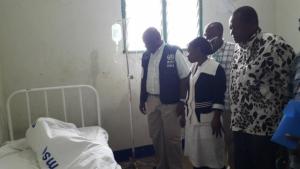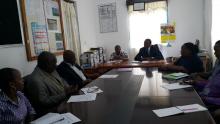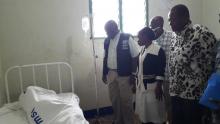Engaging Mara Regional Health Team in finding local solutions to curb Cholera
Mara, 11 February 2016 -- Mara Region is among the 23 Regions affected by the on-going cholera outbreak in Tanzania. As of 11 February, the Region has reported 1,307 cases cumulatively with 44 deaths.
Despite the on-going outbreak control efforts put in place by the Region, cholera transmission continues. WHO Representative, Dr. Rufaro Chatora, visited the Region to take stock of the situation and discuss with the Regional Health Team possible solutions to address the critical challenges faced by the Region.
During the meeting with the Regional Health Managament Team (RHMT), the Regional Medical Officer, Dr. Samson Winani presented an overview of the outbreak in Mara Region; highlighting on-going interventions being implemented and the remaining challenges including:
- Limited access to safe drinking water to communities
- Limited capacity to undertake intensive social mobilization to promote behaviour change and address myths and beliefs
- Limited sanitation facilities in the communities
- Limited resources (fuel, incentives) to conduct surveillance/water source inspections/supervision activities
The meeting discussions came up with the following proposals for Region to pursue with support from WHO. These include:
Provision of safe water: RHMT in collaboration with the local water authorities explore the feasibility of drilling few protected deep wells in selected most affected wards. This will be coupled with community sensitization to use water from the deep wells rather than from unsafe sources. For fishing camps, the Region in collaboration with leaders of the fishermen to explore feasibility of setting up water drums in the camps that can be used to treat collected drinking water.
Targeted Household water treatment: RHMT to estimate Water Guard requirements for targeted distribution in selected highly affected wards. The approach should include a mechanism for monitoring distribution and use of the commodities in the selected communities.
Sanitation: RHMT to identify a demonstration village in the rural areas where support can be provided to promote use of latrines and demonstrate construction of proper latrines. Furthermore, to promote food hygiene including compliance to Public Health by-laws, organize trainings of food vendors on proper food handling and support hygienic food vending through regular inspections.
Intensive Social mobilization: RHMT to plan for targeted intensive social mobilization using community health volunteers and identified influential persons to influence behaviour change related to use of boiled/treated drinking water, use of latrines and handwashing, early treatment seeking behaviour.
Monitoring of water quality: RHMT to identify the capacity needs to ensure regular monitoring of quality of drinking water supplied to communities and provide feedback to water authorities. This includes identifying the equipment needs as well as the focal persons to undertake regular water testing.
__________________________________
Below:
WHO Representative and staff meeting with the Mara Regional Health Management Team under the leadership of the Regional Medical Officer, Dr. Samson Winani
WHO Representative visiting one of the Cholera patients in one of the CTCs in Butiama District Council





